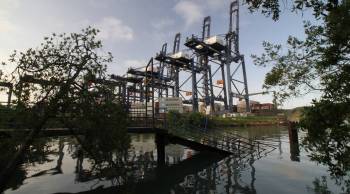Paul Krugman on tech’s great divergence
We were intrigued by a recent piece by New York Times columnist and Nobel Prize-winning economist Paul Krugman called “Robots and Robber Barons.” The column, along with some other posts Krugman put up on his blog, took a look at a question we’re familiar with: Are robots eating our jobs? I went on a cross-country journey in the last year looking at technology and what it’s doing to the American workforce. With people like Krugman now looking at this controversial issue more seriously as well, we wanted to get his take.
“Up until about ten years ago,” says Krugman, “you could look at what was happening in the United States and say look, all those fears about automation, all those fears that the jobs would go away haven’t come true. But if you look at the last ten years there is a pretty dramatic dropoff. Of the total income being generated in this country, a substantially smaller fraction is now going to workers of any kind — including highly skilled workers — and more is going to whoever it is that owns the capital. Which is the kind of thing you would expect to happen if you would have a certain kind of technological change where robots are taking away people’s jobs and forcing people to accept lower wages to stay employed.”
Is all of this because of a quickening pace of technological change? Krugman says no.
“We’ve had pretty rapid technological change for a long time,” he says. “It’s not so much that it’s faster, it’s that it has gone off in a different direction. And it’s no longer saying ‘I, the technological universe, need people with college degrees.’ It’s now saying ‘I, the technological universe, don’t want people. I want machines.’ And so people end up being somewhat devalued.”
Krugman points to things like legal research, which in some instances can already be replaced by certain forms of software. But what about globalization? Couldn’t we attribute some of this divergence of tech and worker wages to jobs just going elsewhere?
“Think back almost 200 years, to the industrial revolution,” says Krugman. “Who were the luddites? Who were the people who were really upset about technology back then? They were actually the weavers who were finding that their skill was suddenly no longer valuable because of the power loom. And to some extent, we may be seeing something of that happening again, where technology is devaluing what were previously well-rewarded skill classes.”
How does Krugman think we can deal with this challenge? Better social safety nets, which he says help to soften the blow when the winds of technology change drastically enough to leave workers with certain high skill sets in trouble. Of course Krugman doesn’t think we’re doing very well at building those social safety nets here in the United States. Krugman’s latest book, “End This Depression Now,” comes out in paperback this month.
There’s a lot happening in the world. Through it all, Marketplace is here for you.
You rely on Marketplace to break down the world’s events and tell you how it affects you in a fact-based, approachable way. We rely on your financial support to keep making that possible.
Your donation today powers the independent journalism that you rely on. For just $5/month, you can help sustain Marketplace so we can keep reporting on the things that matter to you.


















